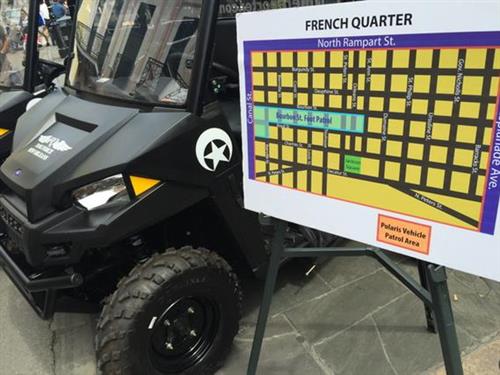The good and bad part of decentralization is the same: There is no center. That allows for all sorts of new possibilities, some of them good.
As I’ve argued before, the U.S. government, that reviled and feared thing, will have less and less ability to control it all, despite surveillance. You don’t have to be a paranoid Birther to see this new reality being born. Even the most suspicious among us may someday long for a strong federal presence.
Speaking of the center not holding: David Amsden’s excellent New York Times Magazine article “Who Runs the Streets of New Orleans?” looks at the privatization of some policing in the French Quarter, a remarkable square mile that’s been marred by mayhem since the destabilizing tragedy of Hurricane Katrina. In response, a single wealthy New Orleans citizen, Sidney Torres, who made his treasure hauling trash, entered into a tech-forward joint effort with the city to fight crime. It may ultimately make things safer, but, of course, there are many dangers in privatizing policing, in having an unelected individual with money dictate policy based on personal beliefs or even whims. There can be a mission creep that doesn’t just target criminals, but also the impoverished and minorities, creating a tale of two cities. While that may not sound too different than current public policing in America, at least elected officials have to answer to those issues.
An excerpt:
In the United States, private police officers currently outnumber their publicly funded counterparts by a ratio of roughly three to one. Whereas in past decades the distinction was often clear — the rent-a-cop vs. the real cop — today the boundary between the two has become ‘‘messy and complex,’’ according to a study last year by Harvard’s Kennedy School of Government. Torres’s task force is best understood in this context, one where the larger merging of private and public security has resulted in an extensive retooling of the nation’s policing as a whole. As municipal budgets have stagnated or plummeted, state and local governments have taken to outsourcing police work to the private sector, resulting in changes that have gone largely unnoticed by the public they’re tasked with protecting.
A recent report by the Justice Department, which has become one of the most prominent advocates of such collaborative efforts, identified 450 partnerships in the country between law enforcement and the private sector. Nationwide, there are now more than 1,200 ‘‘business improvement districts’’ in which businesses pay self-imposed taxes to fund improved services, including security. In many cases, officers covered by corporate entities have become indistinguishable from those paid for by taxpayers. Last year, Facebook entered into a three-year partnership with the Menlo Park, Calif., Police Department in which the social-media giant agreed to pay the $194,000 salary of a police officer whose job was going to be cut. One of the largest private security forces in the nation today is the University of Chicago Police, which has full jurisdiction over 65,000 residents, only 15,000 of whom are students. More than 100 public housing projects in Boston are patrolled by private security, including one company that has been authorized to arrest suspects under certain circumstances.•

